Out-of-control wildfires in B.C. lead to evacuation orders, alerts and smoky skies
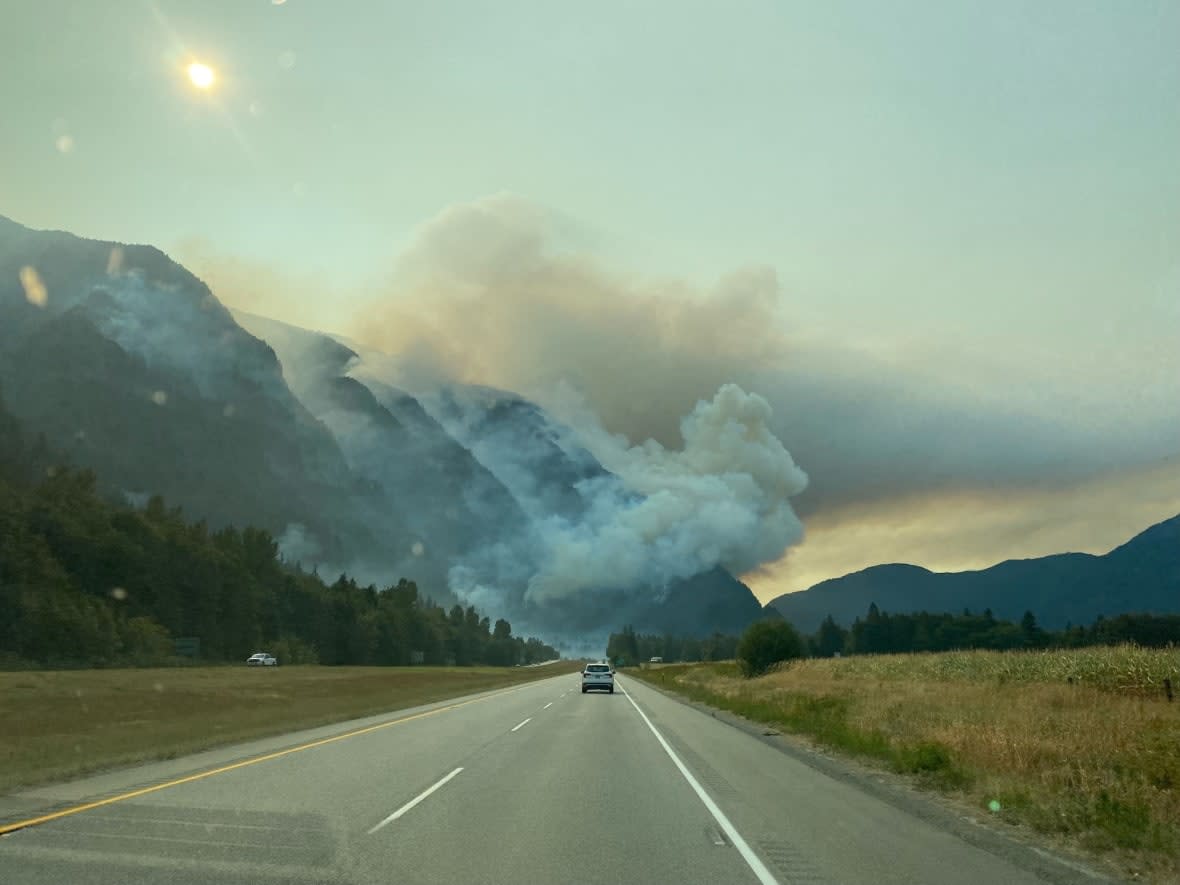
As smoky skies fill much of British Columbia's Lower Mainland and Fraser Valley, 191 wildfires continue to burn across the province, leading to hundreds of people on evacuation alerts, as well as evacuation orders in the Peace region.
Right now, five of the active wildfires are considered notable: the Flood Falls Trail and Heather Lake wildfires in the Coastal fire centre; the Fry Creek wildfire in the Southeast fire centre; and the Battleship Mountain and Bearhole Lake wildfires in the Prince George fire centre.
An air quality advisory has been issued for Metro Vancouver and the Fraser Valley because of high concentrations of fine particulate matter from wildfire smoke in B.C. and the United States.
Evacuation orders
Sunday, the Fraser Valley Regional District and District of Hope issued an evacuation order for 12 properties in Laidlaw and Hunter Creek areas, due to the nearby Flood Falls Trail wildfire.
Laidlaw is a small, unincorporated settlement along Hwy 1, west of Hope.
"Due to hot, dry condition and gusty winds, there is an increase in fire behaviour causing high fire risk," said a news release from the Fraser Valley Regional District.
The Flood Falls Trail wildfire has now grown to 4.5 square kilometres and other homes in the area are under an evacuation alert due to its growth.
Residents under threat of evacuation should gather all essential items, including medications and important documents, fill their vehicles' gas tanks, arrange potential accommodations and implement a plan to safely move livestock, officials said.
Evacuation order for Hudson's Hope, B.C.
An evacuation order was issued Saturday for the municipality of Hudson's Hope, located southwest of Fort St. John in the Peace region.
The Battleship Mountain wildfire, which has scorched 242 square kilometres, is burning out of control, with its leading eastern edge now about 12 to 13 kilometres from Hudson's Hope, according to the B.C. Wildfire Service.
"We're trying to get as many people out of the area as possible," said Mayor Dave Heiberg. "The fire is very aggressive. It's not wanting to be tamed."
Hudson's Hope, which has about 850 residents, is under a local state of emergency.
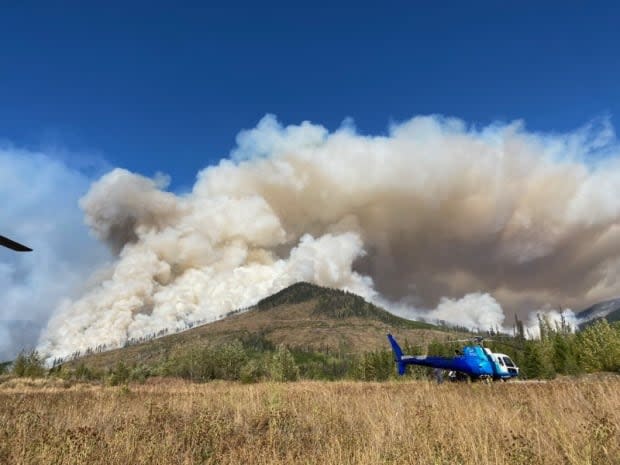
The Peace River Regional District also issued evacuation orders for properties outside of Hudson's Hope, in electoral areas B and E.
A reception centre has opened in Fort. St John and, on social media, residents in nearby communities have offered support, shelter and space to store livestock.
"We've been in this situation before where we've helped out other communities and the outpouring of citizens offering anything ... has just been overflowing for the past 24 hours," said Trevor Bolin, a city councillor.
More than 65 firefighters, 12 helicopters and 16 pieces of heavy equipment are battling the fire, which was first discovered on Aug. 30.
BC Wildfire information officer Shannon Street says the Battleship Mountain fire has seen significant growth over the last 48 hours.
"There's no real end in sight as far as precipitation in the forecast goes, so we are expecting to continue that growth," she said, adding that it has been a very dry summer season and recent temperatures have been above the seasonal average.
"During the daytime, we aren't getting those cooler September temperatures that we normally would get."
Street says crews are busy setting up sprinklers to protect structures like W.A.C Bennett dam, as well as the community of Hudson's Hope.
BC Hydro said in a statement that the dam is included in the evacuation order, but some staff are still on site to operate the dam and generating station.
"At this time, no BC Hydro infrastructure has been impacted and work is being conducted to further protect BC Hydro's people, assets, and infrastructure," said the statement.
On Sunday, the wildfire service said it was able to remove fuel between control lines and the free burning edge of the fire to reinforce the containment lines.
Evacuation alerts remain for Eastgate
The small community of Eastgate, near Manning Provincial Park in southern B.C., is still on evacuation alert due to the Heather Lake fire, which is burning about five kilometres south of Manning Park resort.
The fire has now grown to roughly 86 square kilometres and is being fought by both Canadian and U.S. wildfire agencies, as the fire has stretched across the international border.
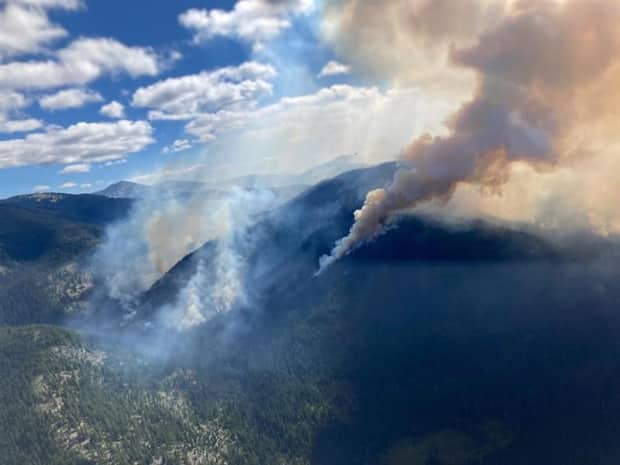
Smoky skies prompt warning
On Sunday afternoon, the eastbound lanes of Highway 1 were closed between Chilliwack and Hope for a 35 kilometre stretch due to a wildfire burning nearby.
A detour is in place for eastbound traffic via Highway 9 and Highway 7, but several motorists said over social media that congestion was causing hours long waits.
Later Sunday, DriveBC asked motorists to consider deferring travel as the alternate route is heavily congested.
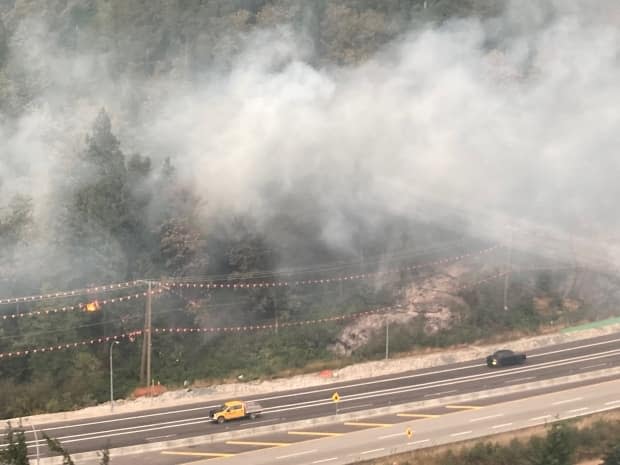
In Metro Vancouver, the Fraser Valley, and the Greater Victoria, the skies have turned hazy due to wildfire smoke.
A fire burning at a wood recycling facility in Vancouver is also contributing to the poor air quality in multiple municipalities, including Burnaby, Richmond, New Westminster, Surrey and Coquitlam, the organization Metro Vancouver says.
It has issued an air quality advisory, warning of high concentrations of fine particulate matter. It says the poor air quality is expected to persist through the weekend.
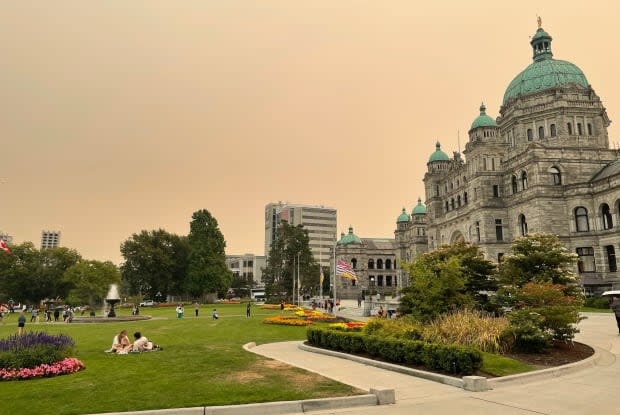
Metro Vancouver says fine particulate matter refers to solid or liquid droplets that can easily penetrate indoors because of their small size.
It's advising people to postpone or reduce outdoor physical activity, especially if breathing feels uncomfortable, including for children and pregnant women as well as for people with underlying conditions like lung disease, asthma and diabetes.
Metro Vancouver says air conditioning can offer some relief from the pollution, and public buildings like libraries may serve as places of refuge in some communities.


